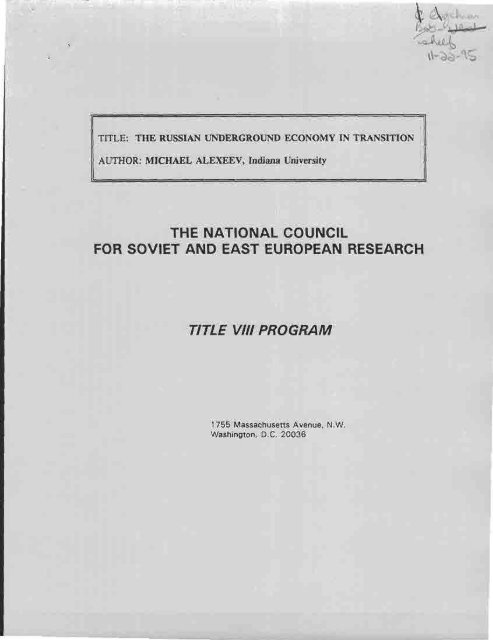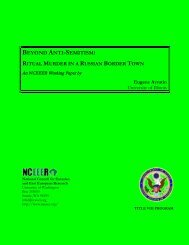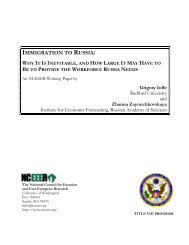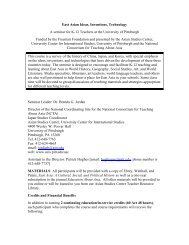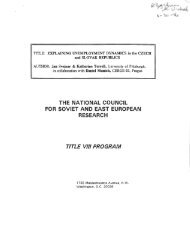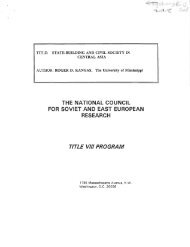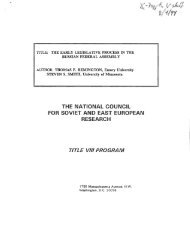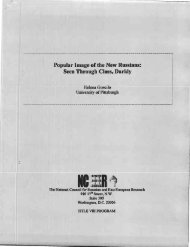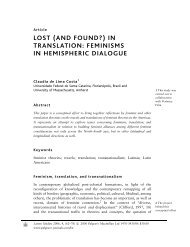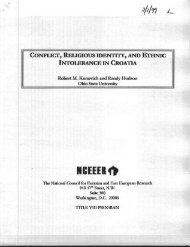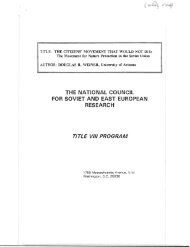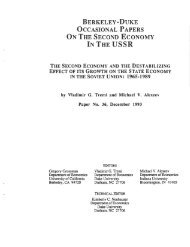The Russian Underground Economy in Transition - University ...
The Russian Underground Economy in Transition - University ...
The Russian Underground Economy in Transition - University ...
Create successful ePaper yourself
Turn your PDF publications into a flip-book with our unique Google optimized e-Paper software.
TITLE: THE RUSSIAN UNDERGROUND ECONOMY IN TRANSITION<br />
AUTHOR: MICHAEL ALEXEEV, Indiana Universit y<br />
THE NATIONAL COUNCI L<br />
FOR SOVIET AND EAST EUROPEAN RESEARC H<br />
TITLE Vlll PROGRAM<br />
1755 Massachusetts Avenue, N .W .<br />
Wash<strong>in</strong>gton, D .C. 20036
PROJECT INFORMATION : '<br />
CONTRACTOR :<br />
PRINCIPAL INVESTIGATOR :<br />
<strong>The</strong> Brook<strong>in</strong>gs Institutio n<br />
Clifford G . Gadd y<br />
COUNCIL CONTRACT NUMBER : 809-04<br />
DATE : November 20, 199 5<br />
COPYRIGHT INFORMATIO N<br />
Individual researchers reta<strong>in</strong> the copyright on work products derived from research funded b y<br />
Council Contract. <strong>The</strong> Council and the U.S. Government have the right to duplicate written reports<br />
and other materials submitted under Council Contract and to distribute such copies with<strong>in</strong> th e<br />
Council and U.S. Government for their own use, and to draw upon such reports and materials fo r<br />
their own studies; but the Council and U.S. Government do not have the right to distribute, o r<br />
make such reports and materials available, outside the Council or U.S. Government without th e<br />
written consent of the authors, except as may be required under the provisions of the Freedom o f<br />
Information Act 5 U.S. C. 552, or other applicable law .<br />
<strong>The</strong> work lead<strong>in</strong>g to this report was supported <strong>in</strong> part by contract funds provided by the Nationa l<br />
Council for Soviet and East European Research, made available by the U. S. Department of State under Title<br />
VIII (the Soviet-Eastern European Research and Tra<strong>in</strong><strong>in</strong>g Act of 1983, as amended) . <strong>The</strong> analysis and<br />
<strong>in</strong>terpretations conta<strong>in</strong>ed <strong>in</strong> the report are those of the author(s).
THE RUSSIAN 1 UNDERGROUND ECONOMY I N TRANSITION<br />
Michael Alexeev 2<br />
Abstract<br />
Prior to market-oriented reforms the underground economy (UE) profoundl y<br />
affected all aspects of the Soviet economy . While the UE had both negative an d<br />
positive effects, on balance it probably made the Soviet system more efficient an d<br />
improved consumer welfare . Market reforms were supposed to br<strong>in</strong>g UE above<br />
ground . Instead, they resulted <strong>in</strong> its explosive growth . <strong>The</strong> UE <strong>in</strong> today's Russia<br />
often <strong>in</strong>hibits the development of competitive markets and causes serious distortion s<br />
<strong>in</strong> the economy . After summariz<strong>in</strong>g the developments <strong>in</strong> the <strong>Russian</strong> UE dur<strong>in</strong> g<br />
transition I exam<strong>in</strong>e the reasons beh<strong>in</strong>d this outcome and analyze its implication s<br />
for the future of reforms .<br />
1 . Introduction .<br />
Even prior to the <strong>in</strong>itiation of market-oriented reforms <strong>in</strong> the late 1980s a great deal o f<br />
genu<strong>in</strong>e market economic activity took place <strong>in</strong> the Soviet Union . While some of these<br />
markets were legal (e .g . the so-called kolkhoz markets for agricultural goods), many wer e<br />
strictly speak<strong>in</strong>g illegal . Law enforcement, however, was generally lax and the risks of smal l<br />
scale operations <strong>in</strong> many of these markets were negligible . For example, despite thei r<br />
commonplace occurrence, crimes of "speculation"' <strong>in</strong> the 1980s accounted for fewer than 2 %<br />
of all reported crimes .' Accord<strong>in</strong>g to Kozlov (1990), Soviet researchers believed that only 1 %<br />
of all crimes of speculation was reported to the authorities. Even this estimate appears to be o n<br />
the high side .<br />
<strong>The</strong> Soviet underground economy was not, of course, limited to resale of good s<br />
purchased or stolen from official vendors . <strong>The</strong> illegal economic activities permeated the entir e<br />
Soviet system . In fact, the official system probably could not have survived for as long as i t<br />
did without the underground economy's help . Besides greas<strong>in</strong>g the wheels of the officia l<br />
1Research for this paper was partially supported by the National Council for Soviet and East Europea n<br />
Research. An earlier version of this paper was presented at the Impact of the <strong>Underground</strong> Econom y<br />
Conference, April 21-22, 1994, Vancouver, Canada, organized by <strong>The</strong> Fraser Institute . I am grateful to Jim<br />
Leitzel and Vladimir Treml for their valuable comments and discussion. All rema<strong>in</strong><strong>in</strong>g errors and omissions are<br />
my own responsibility .<br />
2Department of Economics, Indiana <strong>University</strong>, Bloom<strong>in</strong>gton, IN 47405 ; Tel . : (812) 855-7103 ; Fax: (812 )<br />
855-3736 ; E-mail, MALEXEEV@INDIANA .EDU .<br />
3Speculation was def<strong>in</strong>ed essentially as resale of goods at a profit .<br />
4Rossiiskaia (1993), pp . 135-136 .<br />
1
economy and correct<strong>in</strong>g its mistakes, however, the Soviet underground economy was als o<br />
responsible for significant amounts of waste and distortions . As the official economy stagnate d<br />
and the illegal sector grew rapidly dur<strong>in</strong>g 1970s and 1980s, both the productive potential and<br />
the negative impact of the underground economy on the rest of the economy were becom<strong>in</strong> g<br />
more apparent .<br />
Market-oriented reforms which began, albeit halt<strong>in</strong>gly, <strong>in</strong> the late 1980s and turne d<br />
radical <strong>in</strong> 1992 were <strong>in</strong> part aimed at br<strong>in</strong>g<strong>in</strong>g the illegal economic activities above ground .<br />
Instead, reforms further accelerated the growth of these activities even though the ma<strong>in</strong> cause s<br />
of this growth have changed from price controls to excessive regulation and high tax rates . In<br />
today's Russia the underground economy cont<strong>in</strong>ues to exert both positive and negativ e<br />
<strong>in</strong>fluences on the rest of the economy . It appears, however, that <strong>in</strong> the current environment th e<br />
negative effects of the illegal sector may have begun to overshadow its positive effects .<br />
This paper is organized as follows. <strong>The</strong> next section outl<strong>in</strong>es the size and growth of the<br />
underground economy <strong>in</strong> the USSR prior to market-oriented reforms and analyzes its impact o n<br />
the traditional Soviet economy . A brief description of the major developments concern<strong>in</strong>g the<br />
<strong>Russian</strong> underground economy <strong>in</strong> the late 1980s and early 1990s is presented <strong>in</strong> section 3 .<br />
Section 4 exam<strong>in</strong>es the role of the illegal economic activities <strong>in</strong> the current environment an d<br />
speculates about their implications for the future of reforms .<br />
2. <strong>The</strong> <strong>Underground</strong> <strong>Economy</strong> <strong>in</strong> the Traditional Soviet System .<br />
<strong>The</strong> underground economy has always been an important part of the Soviet system .<br />
Accord<strong>in</strong>g to Shmelev and Popov (1989), even dur<strong>in</strong>g the height of War Communism, whe n<br />
private trade was prohibited and could easily be punished by immediate execution without trial .<br />
the black marketeers provided as much bread for the <strong>Russian</strong> cities as did state procurement .<br />
Black markets cont<strong>in</strong>ued to function dur<strong>in</strong>g Stal<strong>in</strong>'s period as well . <strong>The</strong>y began to gro w<br />
particularly rapidly start<strong>in</strong>g <strong>in</strong> the mid-1960s . By the mid-1970s the underground econom y<br />
permeated all areas of Soviet economic life . 5<br />
Comprehensive price controls accompanied by widespread shortages and prohibition o f<br />
most private economic activities served as the ma<strong>in</strong> reasons for the growth of the Soviet blac k<br />
markets. Other <strong>in</strong>centives for turn<strong>in</strong>g to black markets <strong>in</strong>cluded lack of responsiveness o f<br />
5Illegal economic activities as well as the so-called second economy <strong>in</strong> the USSR have been extensivel y<br />
studied by western economists s<strong>in</strong>ce the pioneer<strong>in</strong>g works by Grossman (1977, 1979) . Accord<strong>in</strong>g t o<br />
Grossman's def<strong>in</strong>ition, the Soviet second economy <strong>in</strong>cluded all economic activities which were either performed<br />
directly for private ga<strong>in</strong>, or were illegal, or both. <strong>The</strong> underground economy constituted a major part of th e<br />
second economy .<br />
2
official production to consumer demand, high taxation and excessive regulation of the allowe d<br />
private economic activities, existence of a large amount of impersonal state property kept under<br />
<strong>in</strong>adequate custody, and the need of poorly paid <strong>in</strong>dividuals to supplement their <strong>in</strong>comes .<br />
One of the most common types of illegal activity <strong>in</strong> the USSR was theft of socialis t<br />
property (i.e. property of the state, collective farms, "social organizations" such as trad e<br />
unions, etc .) . This type of theft used to be taken for granted by the public and did not provoke<br />
serious social disapproval . Even the late Soviet President Brezhnev was quoted as say<strong>in</strong>g to hi s<br />
aides : "You don't know life . No one lives on wages alone. I remember <strong>in</strong> my youth we earned<br />
money by unload<strong>in</strong>g railroad freight cars . So, what did we do? For every three crates or bag s<br />
unloaded we'd take one for ourselves . That's how everybody <strong>in</strong> the country lives ."6 A variant<br />
of theft of socialist property was steal<strong>in</strong>g time from work. Apparently, this phenomenon als o<br />
was commonplace <strong>in</strong> the Soviet economy . As a reflection of the importance of theft <strong>in</strong> th e<br />
Soviet economy, wages <strong>in</strong> different occupations seemed to be <strong>in</strong>versely related to the<br />
opportunity to steal from the workplace . Treml (1990) estimated theft of materials from<br />
workplaces at approximately 63 .7 billion rubles <strong>in</strong> 1975 and 70 .4 billion rubles <strong>in</strong> 1980, o r<br />
between 3 and 5% of the Soviet Gross Social Product (def<strong>in</strong>ed as the value of output of al l<br />
material goods, <strong>in</strong>termediate and f<strong>in</strong>al, valued <strong>in</strong> current purchasers' prices . )<br />
Perhaps just as common was the phenomenon of "speculation" which meant resale o f<br />
goods for personal ga<strong>in</strong>, and as such was illegal. Despite its illegality speculation was<br />
conducted virtually openly . Large markets rem<strong>in</strong>iscent of the American flea markets existed i n<br />
most large Soviet cities . Officially, their function was to allow <strong>in</strong>dividuals to sell unwante d<br />
goods, but <strong>in</strong> reality they became major outlets for sell<strong>in</strong>g stolen property, goods produced i n<br />
the underground economy, and resale of shortage goods purchased at low state-controlle d<br />
prices .<br />
A significant amount of production by s<strong>in</strong>gle artisans as well as by entire undergroun d<br />
factories also took place <strong>in</strong> the underground economy . Workers often produced goods on thei r<br />
own account (and on company time) us<strong>in</strong>g the equipment at their state-owned enterprise . Many<br />
citizens engaged <strong>in</strong> moonlight<strong>in</strong>g, repair<strong>in</strong>g dwell<strong>in</strong>gs and appliances for private customers .<br />
Production of moonsh<strong>in</strong>e was extremely popular <strong>in</strong> the countryside .<br />
Such widespread illegal activities <strong>in</strong> what used to be called a police state could not hav e<br />
been possible without rampant corruption among Soviet officials <strong>in</strong>clud<strong>in</strong>g law enforcement<br />
6Burlatskii (1988), p . 14, quoted <strong>in</strong> Treml (1990) .<br />
3
personnel . <strong>The</strong> exist<strong>in</strong>g large literature on this phenomenon makes it po<strong>in</strong>tless to spend time o n<br />
it here . 7 A quote from Grossman (1977) presents a vivid general picture :<br />
At the very least one can deduce that the purchase and sale of [official] position s<br />
for large sums of money signifies the profound <strong>in</strong>stitutionalization <strong>in</strong> the Sovie t<br />
Union of a whole structure of bribery and graft, from the bottom to the top of th e<br />
pyramid of power; that considerable stability of the structure of power is expecte d<br />
by all concerned ; and that very probably there is a close organic connectio n<br />
between political-adm<strong>in</strong>istrative authority, on the one hand, and a highly develope d<br />
world of illegal economic activity, on the other . In sum, the concept o f<br />
kleptocracy, developed by sociologists with reference to corrupt regimes an d<br />
bureaucracies <strong>in</strong> underdeveloped countries, does not seem <strong>in</strong>applicable to at leas t<br />
certa<strong>in</strong> portions and regional segments of the Soviet party-government hierarch y<br />
(pp . 32-33) .<br />
For obvious reasons it is difficult to estimate the size of the Soviet illegal economy .<br />
Accord<strong>in</strong>g to estimates based on a Berkeley-Duke survey of emigrants from the USSR . about<br />
one third of the urban population's <strong>in</strong>come was derived from the second economy 8<br />
which<br />
employed 10 to 12% of the labor force . 9 Presumably, the bulk of this <strong>in</strong>come was illegal .<br />
Soviet researchers presented a variety of estimates of the illegal economy's turnover rang<strong>in</strong> g<br />
from 70-90 billion rubles to as high 300-350 billion rubles <strong>in</strong> the late 1980s . 1 0<br />
<strong>The</strong> dynamics of the underground economy is even more difficult to ascerta<strong>in</strong> . Koriag<strong>in</strong>a<br />
(1988) estimated that the second economy had grown approximately 4-fold between the lat e<br />
1960s and mid-1980s . Treml and Alexeev's (1994) research based on official retail trade an d<br />
<strong>in</strong>come data strongly suggested that the second economy was grow<strong>in</strong>g rapidly between 196 5<br />
and 1985, but they did not arrive at any specific growth estimates .<br />
While one may argue about the precise estimates of size and growth of the Soviet illega l<br />
economy, it is clear that by the mid-1980s it was hav<strong>in</strong>g a major impact on overall economi c<br />
performance. <strong>The</strong> illegal economic transactions to a large extent obviated ration<strong>in</strong>g i n<br />
consumer markets . For example, Alexeev (1988) demonstrated that even though residentia l<br />
7<strong>The</strong> standard references on Soviet corruption <strong>in</strong>clude Simis (1977-78, 1982) and Vaksberg (1992) .<br />
8Grossman (1987) . <strong>The</strong> estimates relate to the late 1970s . <strong>The</strong> Berkeley-Duke survey covered 106 1<br />
households from urban areas of the USSR . <strong>The</strong> survey sample conta<strong>in</strong>ed various biases such as self-selection o f<br />
the emigres, nationality (most of the respondents were either Jewish or Armenian), and others . <strong>The</strong>se biases ,<br />
however, did not appear to be large enough to <strong>in</strong>validate the reported estimates which are, <strong>in</strong>cidentally, quit e<br />
conservative .<br />
9Treml (1992) .<br />
10<strong>The</strong> first estimate is by Koriag<strong>in</strong>a (1988). <strong>The</strong> second number which was approximately equal to th e<br />
official retail trade turnover <strong>in</strong> the USSR is from Argumenty i fakty, no. 37, 1989, p . 5. <strong>The</strong> aggregate official<br />
personal <strong>in</strong>come <strong>in</strong> 1988-89 was roughly 522 billion rubles . Rutgaizer (1992) provides a survey of Soviet<br />
research on the second economy .<br />
4
state-owned hous<strong>in</strong>g used to be one of the most strictly rationed consumer goods, and despit e<br />
the apparent simplicity of ration<strong>in</strong>g of hous<strong>in</strong>g, its allocation depended mostly on consume r<br />
ability to pay rather than on the proclaimed non-price ration<strong>in</strong>g criteria . Usually redistribution<br />
of consumer goods via black markets must have been welfare-improv<strong>in</strong>g because it was tak<strong>in</strong>g<br />
place through voluntary exchanges among <strong>in</strong>dividuals . Nonetheless, difficulties with<br />
dissem<strong>in</strong>at<strong>in</strong>g <strong>in</strong>formation and enforc<strong>in</strong>g long-term contracts make the underground economy a<br />
less than ideal distribution mechanism . In particular, the need for at least some secrecy ,<br />
comb<strong>in</strong>ed with the fact that some black market transactions are more easily concealed than<br />
others, result <strong>in</strong> added distortions <strong>in</strong> the economy . 11 Also, <strong>in</strong> an otherwise highly distorte d<br />
economy, the <strong>in</strong>troduction of new markets would not always result <strong>in</strong> improved welfare . For<br />
<strong>in</strong>stance, the possibility of resale <strong>in</strong> the black market of officially purchased goods can easil y<br />
lead to longer queues <strong>in</strong> the first economy relative to the situation when such resale i s<br />
effectively prohibited . 12 Note, however, that the relatively well-organized nature of corruptio n<br />
<strong>in</strong> the USSR, reflected <strong>in</strong> the above quote from Grossman, mitigated some of its negativ e<br />
consequences. When corruption is organized, its immediate effects on economic activity tend t o<br />
be more like those of taxation, while unorganized corruption may easily result <strong>in</strong> excessiv e<br />
demand for bribes, thus stifl<strong>in</strong>g economic activity . 1 3<br />
Besides redistribut<strong>in</strong>g goods <strong>in</strong> consumer markets, the illegal economy was <strong>in</strong>volved i n<br />
reallocation of <strong>in</strong>puts and outputs <strong>in</strong> production . 14 Semi-legal or illegal trades among socialis t<br />
enterprises often helped these enterprises to fulfill the plan by correct<strong>in</strong>g the <strong>in</strong>itia l<br />
misallocation of <strong>in</strong>puts . At the same time, the possibility to divert <strong>in</strong>puts and outputs to th e<br />
black market must have worsened the official performance of at least some enterprises . Mor e<br />
important, even if the black markets facilitated plan fulfillment, that does not imply that the y<br />
were good for the economy. From the Soviet consumers' po<strong>in</strong>t of view. some state plans<br />
probably should have never been fulfilled .<br />
In addition, the illegal economy was partly responsible for weaken<strong>in</strong>g and eve n<br />
destroy<strong>in</strong>g the feedback from the economy to the planners . When a planner misallocates <strong>in</strong>puts<br />
but the <strong>in</strong>formal trades among enterprises correct this misallocation, the planner has no reaso n<br />
11 See Shleifer and Vishny (1993) for an example and discussion . This phenomenon is also noted by Leitze l<br />
(1995) .<br />
12See Stahl and Alexeev (1985) for a rather general model of this phenomenon, and Gang and Tower (1988 )<br />
for a simple example .<br />
13 See Shleifer and Vishny (1993) .<br />
14For a description of the illegal economy <strong>in</strong> the socialist <strong>in</strong>dustry see Grossman (1982) .<br />
5
to change <strong>in</strong>put allocations <strong>in</strong> the future . In effect, the planners were direct<strong>in</strong>g the Sovie t<br />
economy us<strong>in</strong>g a highly distorted picture of the economic situation . 1 5<br />
<strong>The</strong> underground economy also played a significant role <strong>in</strong> alter<strong>in</strong>g <strong>in</strong>come distribution i n<br />
the society . As was mentioned earlier, illegal earn<strong>in</strong>gs tended to be <strong>in</strong>versely correlated wit h<br />
distorted official wages . This does not imply, however, that illegal <strong>in</strong>comes reduced <strong>in</strong>equality .<br />
Large and highly variable illegal <strong>in</strong>comes could <strong>in</strong>crease <strong>in</strong>equality no matter how they relate d<br />
to official <strong>in</strong>comes . Based on data from the Berkeley-Duke survey referenced above . Alexee v<br />
and Gaddy (1993) calculated that the <strong>in</strong>clusion of illegal <strong>in</strong>come raised <strong>in</strong>come <strong>in</strong>equality <strong>in</strong> th e<br />
Soviet regions with highly developed underground economies .<br />
In addition to affect<strong>in</strong>g resource allocation <strong>in</strong> the economy, the underground econom y<br />
was responsible for shap<strong>in</strong>g the image of markets among <strong>Russian</strong>s and provided tra<strong>in</strong><strong>in</strong> g<br />
grounds for <strong>Russian</strong> entrepreneurs . In fact, accord<strong>in</strong>g to one survey, the Muscovites seemed to<br />
understand and appreciate the work<strong>in</strong>gs of free markets just as well as the residents of New<br />
York did . 16 On the one hand, this must have helped to create a consensus for market reform s<br />
and promote their progress. On the other hand, underground markets do not adequately reflec t<br />
the power of legal free markets facilitated by a variety of modern market <strong>in</strong>stitutions such as<br />
bank<strong>in</strong>g and stock exchanges . Perhaps for this reason, the market <strong>in</strong> Russia often has a bazaar -<br />
like image rather than that of a sophisticated mechanism that can coord<strong>in</strong>ate the function<strong>in</strong>g o f<br />
a large modern economy .<br />
F<strong>in</strong>ally, one should mention what Cowell (1993) calls "a k<strong>in</strong>d of demoralization crisis "<br />
that could be caused by a large underground economy . Illegal economic activities underm<strong>in</strong>e<br />
the population's trust <strong>in</strong> the fairness of the entire system, either socialist or capitalist . Th e<br />
perception of <strong>in</strong>justice of the economic system is detrimental to welfare by itself even if it is<br />
difficult to fit <strong>in</strong>to the more conventional framework of cost-benefit analysis .<br />
3 . Perestroika, Market Reforms, and the <strong>Russian</strong> <strong>Underground</strong> <strong>Economy</strong> .<br />
By the mid-1980s the Soviet leadership began to understand the significance of th e<br />
underground economy. Nonetheless, it exhibited a highly ambivalent approach toward thi s<br />
sector dur<strong>in</strong>g perestroika . On the one hand, realiz<strong>in</strong>g its potential for improv<strong>in</strong>g Sovie t<br />
economic performance the authorities wanted to br<strong>in</strong>g many private economic activities abov e<br />
ground . On the other hand, the leadership was afraid of los<strong>in</strong>g the remnants of control over th e<br />
15Treml and Alexeev (1994) provide a more detailed discussion of the illegal economy's impact on Sovie t<br />
economic performance .<br />
16Shiller et al . (1991) .<br />
6
economy . This ambivalent attitude resulted <strong>in</strong> a slow and sometimes contradictory relaxation o f<br />
regulations aga<strong>in</strong>st private enterprise. Thus, the November 1986 Law on Individual Labor<br />
Activity which widened the scope of legal private enterprise <strong>in</strong> the USSR was preceded by th e<br />
campaign aga<strong>in</strong>st "non-labor <strong>in</strong>come" <strong>in</strong> May 1986. <strong>The</strong> Law itself provided only a slight<br />
relief from the anti-private enterprise regulations . It cont<strong>in</strong>ued to prohibit many privat e<br />
economic activities, gave regional legislatures broad powers to expand the list of prohibite d<br />
activities, and required every <strong>in</strong>dividual who wanted to engage <strong>in</strong> <strong>in</strong>dividual labor activities t o<br />
obta<strong>in</strong> a license from the local authorities .<br />
Throughout the Gorbachev period, the authorities cont<strong>in</strong>ued to view purely privat e<br />
enterprise with deep mistrust. Instead, they chose to promote family-based and cooperative<br />
forms of economic activities . Family-based contractual arrangements <strong>in</strong> agriculture and famil y<br />
contracts for runn<strong>in</strong>g some small state-owned service outlets were strongly encouraged by the<br />
authorities <strong>in</strong> 1987 and 1988 . A more radical 1988 Law on Cooperatives opened up for<br />
<strong>in</strong>dividuals many areas of the economy which used to be (at least legally) the exclusive domai n<br />
of the state . 17 Even this law, however, did not go nearly far enough to br<strong>in</strong>g genu<strong>in</strong>e lega l<br />
markets <strong>in</strong>to the economy .<br />
<strong>The</strong> newly permitted cooperative activities were subject to various restrictions . Accord<strong>in</strong>g<br />
to the law, cooperatives were restricted <strong>in</strong> their access to <strong>in</strong>puts and were not permitted to<br />
engage <strong>in</strong> some important economic activities . Moreover, the state adm<strong>in</strong>istrative authorities<br />
reta<strong>in</strong>ed the right to exercise significant control over prices charged by producer cooperatives .<br />
<strong>The</strong> local authorities were also allowed to further limit the activities of cooperatives <strong>in</strong> thei r<br />
jurisdictions . All these restrictions handicapped cooperatives' ability to compete among eac h<br />
other and with state-owned enterprises . Particularly harmful to the goals of reforms were<br />
legislative reversals . For example, the December 1988 resolution by the Soviet Council of<br />
M<strong>in</strong>isters prohibited cooperatives from engag<strong>in</strong>g <strong>in</strong> a number of activities (e .g ., medica l<br />
services) permitted by the orig<strong>in</strong>al Law . Changes <strong>in</strong> taxation were especially frequent . 18<br />
Even these half-hearted liberaliz<strong>in</strong>g measures resulted <strong>in</strong> a rapid growth of legitimate<br />
non-state enterprises . 19 This growth, however, did not take place at the expense of th e<br />
shadow economy (to use the Soviet term .) In fact, the partial legitimization of various private<br />
17 "Zakon Soiuza Sovetskikh Sotsialisticheskikh Respublik o kooperatsii v SSSR," Ekonomicheskaia gazeta ,<br />
no. 24, June 1988 .<br />
18For a detailed discussion of the cooperatives dur<strong>in</strong>g perestroika see Jones and Moskoff (1991) and Murph y<br />
(1993) .<br />
19By 1991 the number of cooperatives <strong>in</strong> the USSR reached 255,000 . <strong>The</strong>y employed almost 6 .5 million<br />
people produc<strong>in</strong>g goods and services worth about 42 billion rubles .<br />
7
and crypto-private economic activities seemed to spur the development of the underground .<br />
Accord<strong>in</strong>g to an estimate of a Soviet researcher, the legalization of about 800 million rubles '<br />
worth of the shadow economy <strong>in</strong> 1988 was accompanied by an <strong>in</strong>crease of 1,400 millio n<br />
rubles' worth of various illegal activities . 2 0<br />
What led to such an outcome? As was mentioned above, some of the actions of th e<br />
Gorbachev's government contradicted the general direction of reforms . For example, the anti -<br />
alcohol campaign launched by the Soviet government <strong>in</strong> May of 1985 sharply raised prices o f<br />
alcohol and restricted production of alcoholic beverages by the state . Naturally, this resulted <strong>in</strong><br />
a dramatic rise of bootlegg<strong>in</strong>g and home-brew<strong>in</strong>g . Illegal sales of alcohol reportedly <strong>in</strong>crease d<br />
by 42% <strong>in</strong> the first 10 months of 1986. Some Soviet specialists ma<strong>in</strong>ta<strong>in</strong>ed that the reduction s<br />
<strong>in</strong> state-controlled output of alcoholic beverages was fully offset by <strong>in</strong>creased production of<br />
moonsh<strong>in</strong>e . 2 1<br />
Ironically, even the more radical measures proved to be counterproductive with respec t<br />
to their effect on the underground economy . In fact, it was the 1988 Law on Cooperatives<br />
which, comb<strong>in</strong>ed with the 1987 Law on State Enterprise, was probably ma<strong>in</strong>ly responsible fo r<br />
the growth of the illegal economic activities dur<strong>in</strong>g the 1988-1991 period . Prior to the Law o n<br />
State Enterprise, the Soviet state-owned firms did most of their f<strong>in</strong>ancial transactions b y<br />
adjust<strong>in</strong>g the balances of their accounts <strong>in</strong> Gosbank (the State Bank) . Payment of wage s<br />
constituted the only significant transaction the enterprises conducted <strong>in</strong> cash . While state-owne d<br />
enterprises operated under the so-called soft budget constra<strong>in</strong>t with respect to non-cas h<br />
transaction, the central planners took special care <strong>in</strong> controll<strong>in</strong>g the wage fund and the cas h<br />
budget of enterprises <strong>in</strong> general.22 <strong>The</strong> separation of the cash and non-cash money flows i n<br />
the economy allowed the central planners to alleviate the <strong>in</strong>flationary pressures <strong>in</strong> the consumer<br />
markets .<br />
<strong>The</strong> 1987 law afforded a large degree of autonomy to state-owned enterprises . In<br />
particular, it gave them greater <strong>in</strong>dependence <strong>in</strong> allocat<strong>in</strong>g their f<strong>in</strong>ancial resources withou t<br />
impos<strong>in</strong>g on them serious responsibility for failure . <strong>The</strong> Law on Cooperatives permitted an d<br />
even pushed cooperatives and state-owned enterprises <strong>in</strong>to a close bus<strong>in</strong>ess relationship an d<br />
association. At the same time, state-owned enterprises were allowed to convert their Gosban k<br />
account balances <strong>in</strong>to cash for purposes of transactions with cooperatives . This <strong>in</strong> essenc e<br />
cracked the " wall" between the two types of money flows . <strong>The</strong> conversion of some non-cas h<br />
20 This estimate offered by T. Koriag<strong>in</strong>a was quoted <strong>in</strong> Grossman (1990) .<br />
21 See Treml (1987) and references there<strong>in</strong> .<br />
22<strong>The</strong> term soft budget constra<strong>in</strong>t co<strong>in</strong>ed by J . Kornai essentially means that the enterprises expected to be<br />
bailed out by the state virtually automatically if they ran out of money <strong>in</strong> the non-cash account .<br />
8
alances <strong>in</strong>to cash heightened <strong>in</strong>flationary pressures <strong>in</strong> the economy . In the environment of<br />
cont<strong>in</strong>u<strong>in</strong>g price controls <strong>in</strong> the state sector this strengthened the <strong>in</strong>centives to engage <strong>in</strong> blac k<br />
market activities and to divert output and non-cash balances from state-owned enterprises <strong>in</strong>t o<br />
cooperatives and private enterprises . In other words, the conversion of non-cash <strong>in</strong>to cash wa s<br />
a self-promot<strong>in</strong>g phenomenon which generated growth of the black markets . In addition ,<br />
because diversion of resources from the state sector was usually accomplished through mean s<br />
of at least questionable legality, this diversion itself contributed to a grow<strong>in</strong>g share of illega l<br />
economic activities .<br />
In general, while the restrictions on private and cooperative bus<strong>in</strong>esses might have bee n<br />
imposed <strong>in</strong> order to combat the diversion of state sector resources, these restrictions onl y<br />
exacerbated disequilibria <strong>in</strong> the economy help<strong>in</strong>g reduce competition and generate excessiv e<br />
profits thereby promot<strong>in</strong>g corruption and the growth of the underground . Corruption was<br />
spurred also by the fact that the Soviet bureaucrats at all levels were <strong>in</strong> danger of los<strong>in</strong>g many<br />
of their traditional privileges either due to marketization of the economy or because of popula r<br />
discontent. This provided strong <strong>in</strong>centives to monetize the exist<strong>in</strong>g perks and to conver t<br />
quickly the rema<strong>in</strong><strong>in</strong>g rents associated with their positions <strong>in</strong>to privately owned assets . Bribetak<strong>in</strong>g,<br />
illegitimate privatization of state-owned assets, sweetheart deals between state-owned<br />
enterprises and cooperatives set up by the local bureaucrats, were the most common example s<br />
of abuse of official powers . Corruption was further facilitated by the dependence of private an d<br />
cooperative enterprises on the benevolence of corrupt local authorities which often mad e<br />
entirely legal profitable operations impossible . At the same time, the permission <strong>in</strong> pr<strong>in</strong>ciple o f<br />
private and cooperative enterprise provided an ideal front for expand<strong>in</strong>g the scale of th e<br />
traditional illegal economic activities, and created opportunities for new ones . For example, th e<br />
establishment of commercial banks presented previously virtually non-existent opportunities fo r<br />
bank fraud .<br />
Another important obstacle to legalization of the underground economy was the blac k<br />
marketeers' mistrust of the Soviet government's commitment to market-oriented reforms . In<br />
the absence of such commitment private entrepreneurs were afraid to reveal themselves and th e<br />
extent of their operations . Such fears were supported by significant reversals <strong>in</strong> the progress o f<br />
reforms and by the existence of many old anti-entrepreneurial laws on the books . 2 3<br />
23 Thus, the blanket prohibition of "speculation" was not repealed until January 1992 . Litwack (1991) an d<br />
Boettke (1993) discuss the importance of credible commitment by the government for the success of reforms .<br />
9
4 . <strong>The</strong> <strong>Underground</strong> <strong>Economy</strong> <strong>in</strong> Reform<strong>in</strong>g Russia .<br />
<strong>The</strong> eventual acceptance <strong>in</strong> pr<strong>in</strong>ciple of the market economy came with the breakup o f<br />
the USSR <strong>in</strong> late 1991 . S<strong>in</strong>ce the 1992 reforms the <strong>Russian</strong> economy has no longer bee n<br />
planned from the center <strong>in</strong> the conventional sense of the word . 24 However highly regulate d<br />
the contemporary <strong>Russian</strong> markets are, the <strong>Russian</strong> economy is supposed to be governe d<br />
ma<strong>in</strong>ly by market forces. Nonetheless, a large and perhaps grow<strong>in</strong>g share of the econom y<br />
cont<strong>in</strong>ues to operate underground. <strong>The</strong> flourish<strong>in</strong>g illegal economy <strong>in</strong> today's Russia owes its<br />
existence essentially to the same factors as <strong>in</strong> the traditional Soviet economy, although th e<br />
relative importance of these factors has changed dramatically . Tax evasion appears to have<br />
become the ma<strong>in</strong> reason for operat<strong>in</strong>g bus<strong>in</strong>esses underground, while price controls, variou s<br />
regulations, and the rema<strong>in</strong><strong>in</strong>g prohibitions on private economic activities have become les s<br />
significant .<br />
To the extent that the <strong>Russian</strong> economy suffers from excessive regulation, the role o f<br />
black markets <strong>in</strong> contemporary Russia resembles their role <strong>in</strong> the traditional Soviet economy .<br />
On the one hand, black markets help entrepreneurs get around onerous regulations, thu s<br />
enhanc<strong>in</strong>g the overall economy's performance . 25 On the other hand, underground enterprise s<br />
face difficulties with dissem<strong>in</strong>at<strong>in</strong>g and acquir<strong>in</strong>g <strong>in</strong>formation, and with contract enforcement .<br />
In some important respects, however, the role and impact of the underground econom y<br />
Russia now differ significantly from those <strong>in</strong> its Soviet counterpart .<br />
First, reforms brought with them an unusually high amount of uncerta<strong>in</strong>ty about propert y<br />
rights and about the future of the entire system . <strong>The</strong> admittedly <strong>in</strong>efficient and restrictive<br />
traditional Soviet system was <strong>in</strong> many ways more predictable . <strong>The</strong> elite could count on keep<strong>in</strong> g<br />
their privileges through their old age, while ord<strong>in</strong>ary consumers expected prices to rema<strong>in</strong> lo w<br />
and shortages to persist . <strong>The</strong> system was relatively stable. Even the underground economy<br />
enjoyed a large measure of stability which allowed the black marketeers to plan for the futur e<br />
and put premium on reputation . <strong>The</strong> volatility and turmoil brought about by radical reform s<br />
reduced the present value of follow<strong>in</strong>g the rules, thereby promot<strong>in</strong>g growth of th e<br />
underground . Moreover, the uncerta<strong>in</strong>ty about the future underm<strong>in</strong>es <strong>in</strong>centives for blac k<br />
marketeers to develop and ma<strong>in</strong>ta<strong>in</strong> reputations for high quality of their services . <strong>The</strong> generall y<br />
high level of volatility <strong>in</strong> the economy not only facilitates illegal economic activities, but als o<br />
shortens the time horizon of the agents operat<strong>in</strong>g underground, mak<strong>in</strong>g them likelier to cheat .<br />
24One might argue that the Soviet economy was not really a planned economy even prior to reforms (see ,<br />
for example, Zaleski, 1980 and Roberts, 1990) . Whether we call it central plann<strong>in</strong>g or not, however ,<br />
commands from the center used to play a significant role <strong>in</strong> the function<strong>in</strong>g of the Soviet economy .<br />
25 In the words of Cowell (1993), "a world of perfect enforcement could be an <strong>in</strong>tolerable place . "<br />
1 0
Second, growth of the underground economy reduces the tax base, promot<strong>in</strong>g <strong>in</strong>flatio n<br />
and forc<strong>in</strong>g the government to <strong>in</strong>crease the tax burden on legitimate enterprises . Ris<strong>in</strong>g tax<br />
rates push even more bus<strong>in</strong>esses underground which leads to still higher tax rates, and so on .<br />
Reduced tax revenues lead the government to pr<strong>in</strong>t money impos<strong>in</strong>g <strong>in</strong>flation tax on it s<br />
subjects . Inflation, <strong>in</strong> turn, creates greater uncerta<strong>in</strong>ty with all its negative implications .<br />
Third, the underground economy attracts and promotes organized crime.26 Organized<br />
crime or mafia might play a positive role <strong>in</strong> the economy, for example by help<strong>in</strong>g enforc e<br />
contracts and ma<strong>in</strong>ta<strong>in</strong> order <strong>in</strong> the underground economy, or <strong>in</strong> other circumstances whe n<br />
legal enforcement is not forthcom<strong>in</strong>g . 27 <strong>The</strong> Mafia, however, may impose serious costs on th e<br />
economy as well. To beg<strong>in</strong> with, some potential entrepreneurs may not want to deal with th e<br />
mafia on moral grounds (or just as a matter of taste) . If the only way to run a successfu l<br />
bus<strong>in</strong>ess is to pay protection money to organized crime, these entrepreneurs would not eve n<br />
bother to start up .<br />
Another problem with organized crime's <strong>in</strong>volvement <strong>in</strong> the economy is its tendency t o<br />
favor monopoly . It is <strong>in</strong>terested <strong>in</strong> maximiz<strong>in</strong>g rents, and rents are maximized if a firm has a<br />
monopoly . For example, hav<strong>in</strong>g one restaurant <strong>in</strong> a district may br<strong>in</strong>g significant rents . I f<br />
competition from other restaurants is allowed these rents would be reduced. and crim<strong>in</strong>a l<br />
elements may use force to prevent other restaurants from open<strong>in</strong>g up . 28<br />
In addition, a larger monopoly establishment may be easier for organized crime t o<br />
monitor than several small firms . A similar argument was commonly used to expla<strong>in</strong> the Sovie t<br />
planners' preference for build<strong>in</strong>g large enterprises which often enjoyed a monopoly position i n<br />
their segments of <strong>in</strong>dustry. This advantage of the monopoly is somewhat offset, though, by the<br />
fact that competition facilitates monitor<strong>in</strong>g by provid<strong>in</strong>g a standard of comparison . 2 9<br />
F<strong>in</strong>ally, a monopoly might be less likely to compla<strong>in</strong> to the authorities if organized crim e<br />
shields it from competition and leaves it at least a small portion of the monopoly rents .<br />
26Accord<strong>in</strong>g to a recent <strong>Russian</strong> government report 70-80% of private enterprises <strong>in</strong> major cities wer e<br />
pay<strong>in</strong>g protection money to organized crime (New York Times, January 30, 1994, p . 1 . )<br />
27For an <strong>in</strong>sightful discussion of the economics of organized crime see Schell<strong>in</strong>g (1984) . <strong>The</strong> costs an d<br />
benefits of the mafia <strong>in</strong> the <strong>Russian</strong> economy <strong>in</strong> transition are exam<strong>in</strong>ed <strong>in</strong> Leitzel et al (1995) .<br />
28 This argument works if the organized crim<strong>in</strong>al group itself is runn<strong>in</strong>g the restaurant . If, however, a<br />
crim<strong>in</strong>al group controls the district and can collect fees from establishments located <strong>in</strong> it, the group may be abl e<br />
to raise the more revenues by allow<strong>in</strong>g multiple sources <strong>in</strong> competition .<br />
29In more technical terms, competition elim<strong>in</strong>ates the common uncerta<strong>in</strong>ty fac<strong>in</strong>g the firms' management ,<br />
leav<strong>in</strong>g only firm-specific uncerta<strong>in</strong>ty to <strong>in</strong>fluence its performance (see Holmstrom, 1982) . Lower uncerta<strong>in</strong>ty<br />
leaves less room for the management of the firm to hide its true productive potential from the shareholders (o r<br />
from the mafia) .<br />
1 1
Organized crime is not, of course, new to Russia. In many ways the traditional Sovie t<br />
nomenclature resembled an organized crime group, particularly with respect to illega l<br />
economic activities that took place <strong>in</strong> the USSR . (See the quote from Grossman's study i n<br />
section 2 .) <strong>The</strong> nomenclature used to hold a virtual monopoly on rent extraction from bot h<br />
legal and illegal sectors of the Soviet economy . <strong>The</strong> underground entrepreneurs usually had t o<br />
pay off government officials and law enforcement officers <strong>in</strong> order to stay <strong>in</strong> bus<strong>in</strong>ess . In thi s<br />
sense, the current situation is dist<strong>in</strong>guished by a higher degree of competition among th e<br />
crim<strong>in</strong>al groups and greater "disorganization" of the rent extract<strong>in</strong>g mechanism . 3 0<br />
Despite the chang<strong>in</strong>g nature of the <strong>Russian</strong> underground economy, it could be argued that<br />
the current situation is an improvement over the past <strong>in</strong> that a regulated market economy ,<br />
together with the underground economy, other th<strong>in</strong>gs be<strong>in</strong>g equal, would perform better than<br />
the traditional Soviet system together with its underground economy . While illegal economic<br />
activities exert essentially the same ambiguous <strong>in</strong>fluences on the rest of the economy, the mor e<br />
market-oriented nature of the legitimate economy should hold an advantage over centra l<br />
plann<strong>in</strong>g . 31 <strong>The</strong> net impact of the black markets on the <strong>Russian</strong> economy, however, probabl y<br />
has changed, on balance, from efficiency-enhanc<strong>in</strong>g under central plann<strong>in</strong>g to detrimenta l<br />
dur<strong>in</strong>g transition to markets . Presumably, even an excessively regulated market econom y<br />
would perform better if it is largely legal than if much of it is underground .<br />
What are the implications of the existence of the large <strong>Russian</strong> underground economy fo r<br />
evaluat<strong>in</strong>g the progress of market reforms and for the likelihood of their success? <strong>The</strong><br />
difficulties with measur<strong>in</strong>g illegal economic activities and <strong>in</strong>corporat<strong>in</strong>g them <strong>in</strong>to the system o f<br />
national accounts distort our perceptions of both the pre-reform and the current situation . If the<br />
<strong>Russian</strong> underground has been grow<strong>in</strong>g rapidly over the last several years, then the officia l<br />
data on economic growth underestimate the performance of the <strong>Russian</strong> economy . Such bias is<br />
particularly dangerous <strong>in</strong> the present volatile political situation . Perception of the economi c<br />
failure of reforms can easily become self-fulfill<strong>in</strong>g by, among other th<strong>in</strong>gs, weaken<strong>in</strong>g th e<br />
monetary system, further <strong>in</strong>creas<strong>in</strong>g uncerta<strong>in</strong>ty, and driv<strong>in</strong>g even more entrepreneur s<br />
underground. <strong>The</strong> perceived l<strong>in</strong>k between reforms and economic crime provokes calls fo r<br />
limit<strong>in</strong>g the freedom to engage <strong>in</strong> private economic activities and for other restrictions o n<br />
30<strong>The</strong> relatively disorganized nature of the organized crime currently is evident from government dat a<br />
<strong>in</strong>dicat<strong>in</strong>g that less than 1% of the 4000 "organized crim<strong>in</strong>al groups" <strong>in</strong> Russia consisted of more than 1 0<br />
<strong>in</strong>dividuals. More than half had only 2 or 3 members (Statistika sotsial'nykh anomalii, p. 19 . )<br />
31 I do not want to take this argument too far . For example, the Soviet state might have been much more<br />
efficient at extract<strong>in</strong>g rents from the underground economy while the contemporary mafia may do it <strong>in</strong> a<br />
wasteful manner.<br />
1 2
<strong>in</strong>dividual rights . If reforms become too closely associated with the illegal economy the figh t<br />
aga<strong>in</strong>st crime may lead to serious reversals of reforms . 3 2<br />
<strong>The</strong> underground economy modifies the effect of reform measures directed at the officia l<br />
economy. For example, an <strong>in</strong>crease <strong>in</strong> tax rates may generate greater revenues for the<br />
government if the black markets are underdeveloped . <strong>The</strong>y may, however, reduce revenue s<br />
sharply if the underground economy presents a viable alternative for the entrepreneur . 33 In<br />
order for their policies to achieve the desired effects, the <strong>Russian</strong> reformers should always tr y<br />
to take <strong>in</strong>to account the existence of the large illegal sector <strong>in</strong> Russia . Indeed, it might be<br />
precisely the realization of the limits of their power <strong>in</strong> the face of the underground econom y<br />
that prevents the current government from impos<strong>in</strong>g even more regulations and higher taxes o n<br />
bus<strong>in</strong>esses and <strong>in</strong>dividuals .<br />
<strong>The</strong> reformers should also realize that the problems posed by the large and grow<strong>in</strong> g<br />
underground economy and economic crime cannot be solved by tighten<strong>in</strong>g regulations an d<br />
<strong>in</strong>creas<strong>in</strong>g taxes . On the contrary, it is the reduction of tax rates and the removal of mos t<br />
constra<strong>in</strong>ts on legal private activities that can br<strong>in</strong>g much of the illegal economy above groun d<br />
and improve the performance of the <strong>Russian</strong> markets . Because organized crime thrives on<br />
illegal economic activities, this would also reduce the role and power of the <strong>Russian</strong> mafia .<br />
<strong>The</strong> solution to the problem of economic illegality <strong>in</strong> Russia lies <strong>in</strong> the cont<strong>in</strong>u<strong>in</strong>g advance o f<br />
free market reforms .<br />
32 A more comprehensive discussion of the relationship between economic crime and reforms can be found <strong>in</strong><br />
Alexeev et al . (1995) .<br />
33<strong>The</strong> rollback of cigarette taxes <strong>in</strong> Canada <strong>in</strong> 1994 provides a vivid example of the government recogniz<strong>in</strong> g<br />
the economic power of the underground .<br />
1 3
References<br />
Alexeev, M . "Market vs . Ration<strong>in</strong>g: <strong>The</strong> Case of Soviet Hous<strong>in</strong>g, " Review of Economics an d<br />
Statistics, LXX, 3 :414-420, August 1988 .<br />
, and C . Gaddy, "Income Distribution <strong>in</strong> the U .S .S .R. <strong>in</strong> the 1980s," Review of<br />
Income and Wealth, 39, 1 :23-36, March 1993 .<br />
, C . Gaddy, and J . Leitzel, "Economic Crime and <strong>Russian</strong> Reform," Journal of<br />
Institutional and <strong>The</strong>oretical Economics, forthcom<strong>in</strong>g, 1995 .<br />
Boettke, P . J ., WhyPerestroika Failed : <strong>The</strong> Politics and Economics of Socialis t<br />
Transformation, New York : Routledge, 1993 .<br />
Burlatskii, F ., "Brezhnev i krushenie ottepeli," Literaturnaia gazeta, September 18, 1988, pp .<br />
13-14 .<br />
Cowell, F ., "What's Wrong with Go<strong>in</strong>g <strong>Underground</strong>?" International Economic Insights, IV ,<br />
6:18-20, November/December 1993 .<br />
Grossman, G ., "Sub-Rosa Privatization and Marketization <strong>in</strong> the USSR," Berkeley-Duke<br />
Occasional Papers on the Second <strong>Economy</strong> <strong>in</strong> the USSR, # 17, 1989 .<br />
, "Roots of Gorbachev's Problems : Private Income and Outlay <strong>in</strong> the Late 1970s, "<br />
Jo<strong>in</strong>t Economic Committee, U .S . Congress, Gorbachev's Economic Plans, v. 1, Wash<strong>in</strong>gton . DC .<br />
1987, pp . 213-229 .<br />
, "<strong>The</strong> 'Shadow <strong>Economy</strong>' <strong>in</strong> the Socialist Sector of the USSR," <strong>in</strong> <strong>The</strong> CMEA Five-<br />
Year Plans (1981-1985) <strong>in</strong> New Perspective, NATO Colloquium, Brussels, 1982, pp . 99-115 .<br />
, "Notes on the Illegal Private <strong>Economy</strong> and Corruption," <strong>in</strong> Jo<strong>in</strong>t Economi c<br />
Committee, U .S . Congress, Soviet <strong>Economy</strong> <strong>in</strong> a Time of Change, Wash<strong>in</strong>gton, DC, 1979, pp . 834 -<br />
855 .<br />
, "<strong>The</strong> Second <strong>Economy</strong> <strong>in</strong> the USSR," Problems of Communism, 26, 5 :25-40 ,<br />
September/October 1977 .<br />
Gang, I., and E . Tower, "<strong>The</strong> Stahl-Alexeev Paradox : A Note," Journal of Economic <strong>The</strong>ory ,<br />
44 :189-191, 1988 .<br />
Holmstrom, B ., "Moral Hazard <strong>in</strong> Teams," Bell Journal of Economics, 13, 2:324-340, Autum n<br />
1982 .<br />
Jones A ., and W . Moskoff, Ko-ops: the Rebirth of Entrepreneurship <strong>in</strong> the Soviet Union ,<br />
Bloom<strong>in</strong>gton, IN : Indiana <strong>University</strong> Press, 1991 .<br />
Koriag<strong>in</strong>a, T ., Voprosy ekonomiki, no. 3 :110-19, 1990 .<br />
Kozlov., Iu., "Tenevaia ekonomika i prestupnost'," Voprosy ekonomiki, no . 3 :120-7 . 1990 .<br />
Leitzel, J ., "Goods Diversion and Repressed Inflation : Notes on the Political <strong>Economy</strong> of Pric e<br />
Liberalization" Public Choice, forthcom<strong>in</strong>g, 1995 .<br />
, C . Gaddy, and M . Alexeev, "Mafiosi and Matrioshki," Brook<strong>in</strong>gs Review, 13, 1 :26-<br />
29, W<strong>in</strong>ter 1995 .<br />
Litwack, J ., "Discretionary Behavior and Soviet Economic Reform," Soviet Studies, 43, 2 :255-<br />
279, 1991 .<br />
Murphy, M ., "Competition Under the Laws Govern<strong>in</strong>g Soviet Producer Cooperatives Dur<strong>in</strong> g<br />
Perestroika," <strong>in</strong> P . Patterson, ed ., Capitalist Goals Socialist Past : <strong>The</strong> Rise of the Private Sector i n<br />
Command Economies, Westview Press, 1993, pp. 147-168 .<br />
Roberts, P. C., Alienation and the Soviet <strong>Economy</strong>, New York : Holmes and Meier, 1990 .<br />
Rossiiskaia Federatsiia v tsifrakh v 1992 godu, Moscow: Goskomstat Rossii, 1993 .<br />
Rutgaizer, V ., "<strong>The</strong> Shadow <strong>Economy</strong> <strong>in</strong> the USSR : Part 1 . A Survey of Soviet Research : Part<br />
2 . Siz<strong>in</strong>g up the Shadow <strong>Economy</strong> : Review and Analysis of Soviet Estimates," Berkeley-Duke<br />
Occasional Papers on the Second <strong>Economy</strong> <strong>in</strong> the USSR, # 34, February 1992 .<br />
1 4
Schell<strong>in</strong>g, T., Choice and Consequence, Cambridge : Harvard <strong>University</strong> Press, 1984 .<br />
Shiller, R., M . Boyko, and V . Korobov, "Popular Attitudes toward Free Markets : <strong>The</strong> Soviet<br />
Union and the United States Compared," American Economic Review, 81 :385-400, 1991 .<br />
Shleifer, A. and R. Vishny, "Corruption," Quarterly Jounal of Economics, 108, 3 :599-617 ,<br />
1993 .<br />
Simis, K ., USSR : <strong>The</strong> Corrupt Society, New York: Simon and Schuster, 1982 .<br />
, "<strong>The</strong> Mach<strong>in</strong>ery of Corruption <strong>in</strong> the Soviet Union," Survey, 23, 4(l05):35-55 ,<br />
Autumn, 1977-78 .<br />
Smelev, N ., and V . Popov, Na perelome; ekonomicheskaia perestroika v SSSR, Novosti ,<br />
Moscow, 1989 .<br />
Stahl, D., and M . Alexeev, "<strong>The</strong> Influence of Black Markets on a Queue-Rationed Centrall y<br />
Planned <strong>Economy</strong>," Journal of Economic <strong>The</strong>ory, 35, 2 :234-50, 1985 .<br />
Statistika sotsial ' nykh anomalii, Moscow: Goskomstat RSFSR, 1991 .<br />
Treml, V ., "A Study of Labor Inputs <strong>in</strong>to the Second <strong>Economy</strong> of the USSR," Berkeley-Duk e<br />
Occasional Papers on the Second <strong>Economy</strong> <strong>in</strong> the USSR, # 33, January 1992 .<br />
, "A Study of Employee <strong>The</strong>ft of Materials from Places of Employment," Berkeley -<br />
Duke Occasional Papers on the Second <strong>Economy</strong> <strong>in</strong> the USSR, # 20, June 1990 .<br />
, "Gorbachev's Anti-Dr<strong>in</strong>k<strong>in</strong>g Campaign : A 'Noble Experiment' or a Costly Exercis e<br />
<strong>in</strong> Futility?" <strong>in</strong> Jo<strong>in</strong>t Economic Committee, U .S . Congress, Gorbachev's Economic Plans, v. 2 ,<br />
Wash<strong>in</strong>gton, DC, 1987, pp . 297-311 .<br />
, and M . Alexeev, "<strong>The</strong> Growth of the Second <strong>Economy</strong> <strong>in</strong> the Soviet Union and Its<br />
Impact on the System," <strong>in</strong> R. Campbell, ed ., <strong>The</strong> Postcommunist Economic Transformation, Boulder ,<br />
Colo . : Westview Press, 1994, pp . 221-248 .<br />
Vaksberg, A ., <strong>The</strong> Soviet Mafia, St. Mart<strong>in</strong>'s Press, 1992 .<br />
Zaleski, E., Stal<strong>in</strong>ist Plann<strong>in</strong>g for Economic Growth, 1933-1952, Chapel Hill : <strong>University</strong> of<br />
North Carol<strong>in</strong>a Press, 1980 .<br />
1 5


